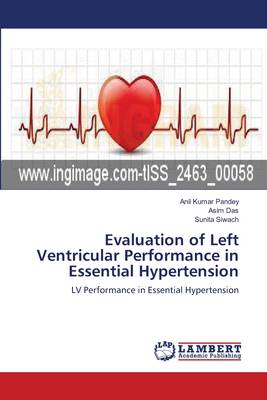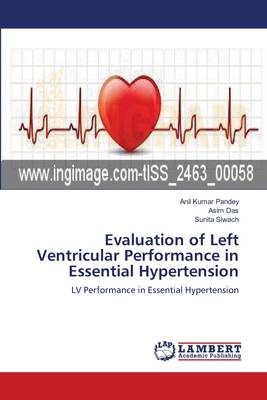
Bedankt voor het vertrouwen het afgelopen jaar! Om jou te bedanken bieden we GRATIS verzending (in België) aan op alles gedurende de hele maand januari.
- Afhalen na 1 uur in een winkel met voorraad
- In januari gratis thuislevering in België
- Ruim aanbod met 7 miljoen producten
Bedankt voor het vertrouwen het afgelopen jaar! Om jou te bedanken bieden we GRATIS verzending (in België) aan op alles gedurende de hele maand januari.
- Afhalen na 1 uur in een winkel met voorraad
- In januari gratis thuislevering in België
- Ruim aanbod met 7 miljoen producten
Zoeken
Evaluation of Left Ventricular Performance in Essential Hypertension
LV Performance in Essential Hypertension
Anil Kumar Pandey, Asim Das, Sunita Siwach
Paperback | Engels
€ 95,45
+ 190 punten
Omschrijving
Author explained how Echocardiography can be utilized for structural and functional information about heart in hypertension. Echocardiography is the best procedure to evaluate the cardiac effects of systemic hypertension, he most common cause of left ventricular hypertrophy and congestive heart failure in adults.Measurement of LVM by echocardiography is valid, serially reproducible and clinically applicable but has high inter-study variability, even with meticulous attention to technique.Since LVH is an important independent risk factor for cardiovascular complications in hypertensive patients, its detection may have an impact on patient management. In this context, echocardiography is very useful tool to measure the parameters of afterload (ESS, EISS) quantitatively and noninvasively, to evaluate the effect of pharmacological and non pharmacological methods for their effect on afterload.Because of its simplicity,lack of radiation exposure and lower cost than techniques of promising accuracy echocardiography has been established as an evaluation tool for research and clinical evaluation of hypertensive subjects. Dr ANIL KUMAR PANDEY, MD
Specificaties
Betrokkenen
- Auteur(s):
- Uitgeverij:
Inhoud
- Aantal bladzijden:
- 212
- Taal:
- Engels
Eigenschappen
- Productcode (EAN):
- 9783659438738
- Verschijningsdatum:
- 31/10/2013
- Uitvoering:
- Paperback
- Afmetingen:
- 150 mm x 220 mm
- Gewicht:
- 318 g

Alleen bij Standaard Boekhandel
+ 190 punten op je klantenkaart van Standaard Boekhandel
Beoordelingen
We publiceren alleen reviews die voldoen aan de voorwaarden voor reviews. Bekijk onze voorwaarden voor reviews.









